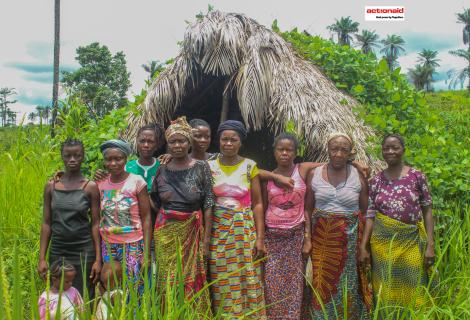AGROECOLOGY: A SHOW OF RESILIENCE FOR WOMEN FARMERS

Female farmers are the corner stone of the agricultural system and the main method of the same in Sierra Leone is subsistence farming. This system is mainly rain-fed and characterized by low output. Though they handle the toughest part of farm toil, women often have little or no say in determining how the system works or even owning they land the work on. Along the same line, women’s role in agroecology and a sustainable means of farming is recurrently downplayed.
With Agroecology, women farmers best utilize natural resources while preserving them. Agriculture blooms when it is in sync with the local bionetwork thereby improving soil fertility and crop quality through available biomass and biodiversity rather than the use of chemical fertilizers, excessive use of pesticides which affects the chemistry of the soil while also killing many useful bacteria. It is known to be both an alleviation and adaptation approach to the climate crisis. The engagement of women and their social networks in Agriculture helps to accelerate food systems transformation globally.
The government of Sierra Leone has launched the ‘Feed Salone’ agenda in a bid to ignite agricultural productivity, safeguard food security, and foster inclusive economic growth for sustained prosperity. In like manner, engaging local women has been a part of ActionAid Sierra Leone’s strategies in ensuring agroecological method of farming has been harnessed. Rural women have benefited from trainings, small grants, and seeds to support women’s empowerment and economic liberty in those communities.
Women’s group like the ‘Mothers’ club in sponsorship communities have served as a platform where women converge to support one another, advocate for change, improve livelihoods and maintain accountability in their community.
For Selena Woody, a 38-year-old farmer in the South-Eastern Region of Sierra Leone, farming is no longer as it used to be. Selena and other female farmers face numerous challenges when it comes to crop production. Soil depreciation, excessive rainfall, pest infestation, and poor harvest.
“Since last year, I’ve experienced a drastic change in weather patterns. The rains no longer come at the expected time and when it falls, its usually a heavy downpour, washing away the soil nutrients, drowning seedlings, and attracting mold and diseases which affect yield.”
Waging war against economic hardship, Selena and other female farmers employ a farming cooperative strategy for ‘mothers’ club’ members who farm together intercropping rice, cassava, beans, okra, and cucumber while applying agroecological techniques. They discourage synthetically concentrated agriculture and are working towards solutions in restoring soil health and improving productivity.
“Agriculture is my only source of income; I don’t know how my family would have survived during these times of financial difficulty if not for the profit I get from selling cassava, cassava leaves, foo-foo (a soft dough made from cassava), and garri (cassava flakes). Usually, after working in our group farm, I go to my small garden where I plant greens which I harvest and sell, providing another source of income for me. My husband has been sick for over two years and all the family responsibility rests on my shoulders. I have to work relentlessly to keep my nine children in school and provide all their needs.”
Women face gender-specific obstacles such as lack of access to land, equal treatment and suitable working conditions, putting female farmers at a significant disadvantage. Arguably, one of the biggest challenges faced by female farmers is land rights as a persistent gender inequality in agriculture make landowners reluctant to do business with female farmers, they’d rather talk with her husband. In Selena’s words “my husband purchased the land which I farm on as it is difficult for women to access land because we are not trusted enough to own lands as women.”
Selena is thrilled that Agroecology has allowed her break free from the cycle of debt. By using natural methods, she has improved crop yields and saved money on expensive pesticides. “I am glad I don’t have to depend on anyone,” she put in.
